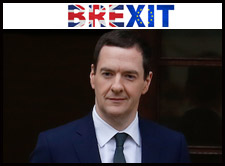
UK Chancellor of the Exchequer George Osborne abandoned his main target of achieving a budget surplus by 2020, as uncertainty linked to the implementation of the unexpected "Brexit" decision is likely to cause an economic slowdown.
"As the Bank of England Governor said, the referendum result is likely to produce a large negative shock to our economy," Osborne said in a speech to business leaders on Friday.
"How we respond will determine the impact on people's jobs and on economic growth."
The chancellor tweeted earlier on Friday that there were clear signs of economic shock in the aftermath of the "Leave" vote. The country requires "supreme national effort" to come out of the crisis, he added.
"The Bank of England can support demand, the Government must provide fiscal credibility, so we will continue to be tough on the deficit but we must be realistic about achieving a surplus by the end of this decade," Osborne said in the speech.
Even before "Brexit", economists had expressed doubt regarding the achieving a budget surplus by 2020, a goal set by Osborne in the budget in July last year.
The Bank of England Governor Mark Carney said on Thursday that some monetary policy easing will likely be required over the summer, but stressed that there were limits to what monetary policy can do.
In the June 23 referendum, 52 percent of Britons voted to leave the EU in a historic and surprise move.
A day after, Prime Minister David Cameron, who had passionately campaigned for the country to remain in the EU, said he will step down in October and the exit negotiations should take place under a new PM.
Once seen as the future UK Prime Minister, Osborne last week decided not to join the fray to fill the post.
Osborne was able to reduce the budget deficit from over 10 percent of GDP, when he first became the chancellor, to just under 4 percent for the 2015/16 fiscal year.
In the budget presented in March, the deficit was forecast to fall to 2.9 percent next year.
Following "Brexit", it is widely expected that the government will raise borrowing than increases taxes in an otherwise troubled economy.
Announcing her bid for the Tory leadership on Thursday, the lead contender and a "Remain" campaigner like Osborne, Theresa May said there was no scope of attaining a budget surplus by 2020.
"If before 2020 there is a choice between further spending cuts, more borrowing and tax rises, the priority must be to avoid tax increases since they would disrupt consumption, employment and investment," Home Secretary May said.
Elsewhere today, IMF Chief Economist Maurice Obstfeld said in an interview that the U.K. and global economic projections will be revised and the results will be negative. The latest forecasts from the lender is due on July 19.
by RTT Staff Writer
For comments and feedback: editorial@rttnews.com
Business News

